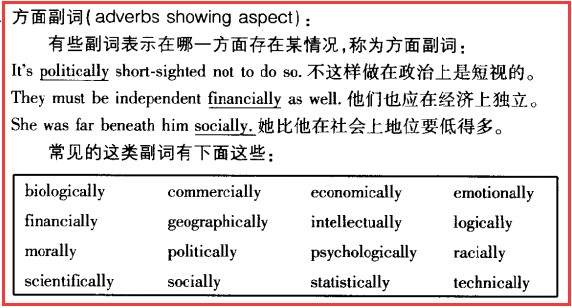3 英语的方面副词有哪些
最佳答案 2021-10-10 00:56
方面副词表示在与“某个专业领域”相关方面的副词,mentally, physically, socially, technologically,politically,economically,technically, financially,psychologically
【解答如下:】副词(adverb 缩写adv.):用来修饰形容词或者副词表示程度的强弱,以及表示动作发生的特点,特征和频率以及描述动作发生方式,时间,地点,条件,原因,结果,比较,目的,让步的词叫副词。
英语中的副词主要分为以下九大类
(1) 时间副词:表示动作发生时间的副词now, then, soon, ago, recently, lately, later, finally, before, early, today tomorrow, yesterday, tonight, suddenly, immediately, already, just 等。
He went home yesterday. =Yesterday he went home. 他昨天回家了。
He went to Paris recently. =He recently went to Paris.
= Recently he went to Paris. 最近他去了巴黎。
(2)地点副词:表示动作发生地点的副词here, there, up, down, away, nearby, home, ahead, abroad, indoors, overseas, halfway, upstairs, downstairs 等。
Can you help to carry this table upstairs?
你能帮忙把桌子搬到楼上去吗?
The boy read quietly over there all afternoon.
这男孩整个下午都在那儿静静地看书。
(3)方式副词:表示动词的行为方式的副词carefully, happily, quietly, heavily, warmly, correctly, politely, angrily等。
He looked curiously at everyone who got off the plane.
他好奇地打量着从飞机上走下来的每一个人。
He quickly got dressed. 他赶紧穿好衣服。
He angrily tore up the letter. 他很生气,把信撕碎了。
(4)频度副词:表示动作发生的次数及频率的副词ever, never, rarely, seldom, once, often, occasionally, constantly, frequently, usually, continually, always 等。
He often comes to see us. 他常来看我们。
He is seldom late for school. 他上学很少迟到。
She always was late. (放在系动词前加强语气)她老是迟到。
(5)程度福词:表示程度强弱的副词fairly, pretty, rather, quite, very, much, too, greatly, almost, nearly, half, highly, awfully, deeply, partly, perfectly, really ,badly等。
Houses are much more expensive these days.
如今的房价贵多了。
They have both behaved very badly and I am very hurt.
他们俩都很不友善,让我非常难过。
This is quite (much) the most expensive radio here.
这是这里最贵的收音机。
I quite agree with you.
我完全同意你的意见。(不用fairly, pretty, very)
We rather like the film.
我们很喜欢这部电影。(不用fairly, pretty, very)
(6)疑问副词:用来提问并引出特殊疑问句的副词:when, where, why, how
When will it be ready? 这什么时候能准备好?
Where do you come from? 你是哪里人?
Why was she crying? 她刚才为什么哭?
How did you come here?你怎样来到这里?
(7)连接副词:用来引导名词性从句的副词when, why, where, how
Tell me when we shall leave. =Tell me when to leave.
告诉我什么时候离开。
I don’t know how I can find him. =I don’t know how to find him.
我不知道如何找到他。
Where we can get the money is just our problem. / Where to get the money is just our problem.
到哪里去弄这笔钱正是我们头痛的事。
That’s why he speaks English so well.
那就是他为什么英语讲得这么好的原因。
(8)关系副词:用来引导定语从句的副词when, where, why
Sunday is the day when very few people go to work.
星期日是没什么人上班的日子。
That’s the reason why he dislikes me.
这就是他不喜欢我的原因。
Do you know a shop where I can find sandals?
你知道哪家商店我能找到凉鞋吗?
(9)句子副词:句子副词也叫评论性副词,用于修饰句子(而不是修饰某个单词),反映说话人的观点和看法,如 actually, certainly, clearly, definitely, evidently, fortunately, frankly, honestly, luckily, obviously, perhaps, possibly, probably, surely, undoubtedly, unexpectedly 等。
Obviously he can’t tell the difference between them.
显然他无法区别两者的不同。
【特别备注】有的句子副词也可用作其他种类的副词,不过这往往会导致位置和语义的变化:
Clearly he didn’t say so. 显然他没有这样说。(句子副词)
He didn’t say so clearly. 他说得没有那么清楚。(方式副词)
Frankly, you are wrong. 说实在的,你错了。(句子副词)
He spoke frankly about his past life. 他坦率地谈了他过去的生活。(方式副词)
如果觉得我的回答对您有用,请随意打赏。你的支持将鼓励我继续创作!

- 3 关注
- 1 收藏,3474 浏览
- 奉国平 提出于 2021-08-16 11:03
相似问题
- 一类表达中的修饰关系问题及其他问题 1 回答
- 副词also和always是具体哪类副词 1 回答
- 程度副词与强调副词有何区别 2 回答
- first是什么副词(作什么状语) 2 回答
- outwardly是方面副词吗 2 回答
-
 《高考英语备考1号·速效编》
《高考英语备考1号·速效编》
-
 《高考英语备考1号·写作编》
《高考英语备考1号·写作编》
-
 《高中英语晨读晚记》
《高中英语晨读晚记》
-
 《高中英语错题笔记》
《高中英语错题笔记》
-
 《零起点考大学英语》
《零起点考大学英语》
-

